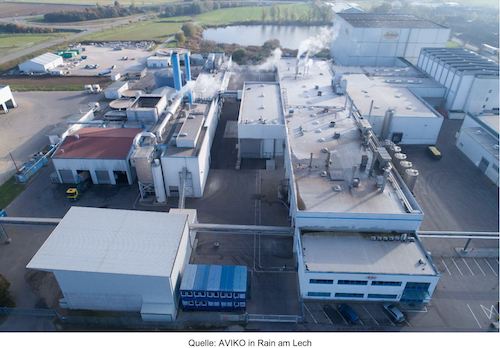
Rain biomass heating company
Rain Biomasse Wärmegesellschaft (RBW) is planning to expand its existing biomass heating plant with an additional biogas and natural gas steam generation plant. This is to be installed in the existing building and integrated into the existing system during ongoing production operation. Thanks to the new steam generation plant, steam production gains in flexibility, biogas utilisation increases and at the same time CO2 emissions from steam production are reduced. eta Energieberatung supports the RBW in the planning and implementation of the project as well as in the procurement of subsidies.
Key data on the project
Rain Biomasse Wärmegesellschaft mbH
The business areas of Rain Biomasse Wärmegesellschaft (RBW) include the operation of a biomass heating plant to generate and supply the company AVIKO Deutschland GmbH with steam and the extraction of heat/waste heat.
Industry sector
Power Generation
Project location
Rain am Lech
Zielgruppe
Public utilities, municipalities, public institutions, energy suppliers, food producers
Keywords
Design planning, steam boiler plant, biogas and natural gas dual fuel firing, renewable energies, CO2 reduction, retrofitting in existing buildings, expansion during ongoing production operation, subsidies
Technical data

Customer benefits
The RBW receives an optimised planning concept for the installation of the additional biogas and natural gas steam generation plant in the existing building of the biomass heating plant and its integration into the existing system with connection to the existing supply network during ongoing production operation. Thanks to the new steam generation plant, the steam production gains in flexibility due to an improved partial load behaviour, the biogas utilisation increases and at the same time the CO2 emission of the steam production is reduced. As a result, the steam production of the RBW remains economical and sustainable in the long term.
Terms of reference
Rain Biomasse Wärmegesellschaft (RBW) operates a biomass heating plant and supplies AVIKO Deutschland GmbH with steam. At the same time, it obtains biogas from the biogas production of AVIKO Deutschland GmbH. Due to an increase in production, both more biogas is produced and more steam is needed. RBW is therefore planning to expand its biogas utilisation with an additional steam generation plant. For this purpose, a steam boiler system operated with biogas and natural gas is to be installed in the existing building of the biomass heating plant and integrated into the existing system during ongoing production operation. eta Energieberatung supports RBW in the planning and implementation of the project and in the procurement of subsidies. In a first step the design planning and the research for subsidies were completed. In the following the most economical and most practicable system constellation is to be realised.
We at LEW would like to thank eta Energieberatung for the very good cooperation in the above mentioned project. The results of the design planning and the very good summary of the results give the client an important basis for his decision. We can recommend eta Energieberatung at any time.
Markus Blaas
LEW, Project management (by order of RBW)
Scope of services
The scope of services of the design planning essentially refers to
